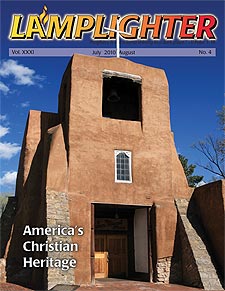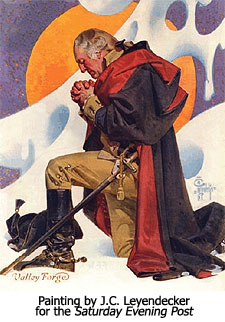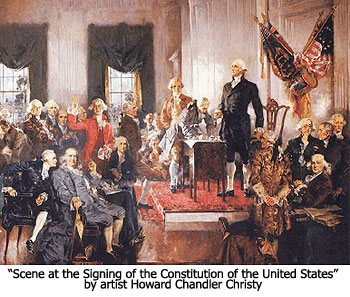America’s Christian Heritage
Is America based on Christian principles?

The American constitutional system was the first government devised by Man that was based upon biblical principles.
Its cornerstone was a belief in the evil nature of Man, which produced a conviction that no person can be trusted with power. This belief that Man’s nature is corrupted and irreparable (apart from the power of the Holy Spirit) represented a radical departure from history. Until that time, most of Mankind had always been ruled by kings who were considered to have a divine right to rule and who usually ended up ruling like they thought they were gods.
A Biblical Example
I am reminded of the children of Israel when they arrived in the Promised Land under the leadership of Joshua. The Lord God Almighty served as their king. He protected them and blessed them with freedom and prosperity. When they took their eyes off Him and rebelled, He would allow foreign nations to conquer them. When they repented, He would raise up leaders, called judges, who would deliver them from foreign domination.
This unique form of supernatural rule continued for 400 years until the people rose up in rebellion during the judgeship of Samuel and demanded an earthly king so that they would be “like all the other nations” (1 Samuel 8:5, 20). Samuel tried to warn them that an earthly king would abuse his power and make their lives miserable by sending their sons into war, exploiting their daughters, confiscating their fields, and imposing heavy taxation (1 Samuel 8:10-18). But they would not listen, and they got what they asked for — a long history of abusive kings.
A Unique Form of Government
The American colonists rebelled against such a king, and they had no intention of replacing the British monarch with an American one. What is amazing is that they did not proceed to establish an oligarchical form of government since most of the leaders of the American Revolution were wealthy aristocrats.
But the vast majority of them were also devout Christians, and they were fully aware of the biblical teaching about the fallen nature of Man (Jeremiah 17:5,7,9):
5) Thus says the Lord, “Cursed is the man who trusts in mankind…
7) “Blessed is the man who trusts in the Lord…
9) “The heart is more deceitful than all else
And is desperately sick…”
Accordingly, our Founding Fathers did not trust anyone with power — not even themselves. They therefore proceeded to construct a government that would limit the use of power.

Equally important was their conviction that the Word of God constitutes a higher law to which all men and governments are subject and that the fundamental rights of Mankind are derived from that law and not from government. Thus, in the nation’s Declaration of Independence, Thomas Jefferson wrote:
“We hold these truths to be self-evident, that all men are created equal, that they are endowed by their Creator with certain inalienable rights, that among these are life, liberty and the pursuit of happiness. That to secure these rights, governments are instituted among men, deriving their just powers from the consent of the governed.”
To put it another way, the Founding Fathers of our nation expressly rejected the traditional philosophy of Humanism and its concept that Man is basically good and capable of perfection and that therefore those who are highly educated have a natural right to rule over those less fortunate. They also rejected the radical form of Humanism that came to prevail in the French Revolution and which produced a reign of terror — namely, a belief in the essential goodness of the common man.
Again, because of their world view, our Founding Fathers trusted no one. They refused to establish a monarchy or an oligarchy. But they also distrusted the common man, and so they refused to establish a democracy because they feared it would quickly evolve into mobocracy.
A Representative Republic
They therefore carefully constructed a representative republic with an ingenious set of checks and balances. For example, in the original government established by our constitution, there was only one national official directly elected by the people — the local Congressman who was elected to serve for two years in the House of Representatives. Senators were not directly elected. They were appointed by state legislatures, and this continued to be the case until the adoption of the 17th Amendment in 1913 which requires the selection of Senators by direct popular vote.
Likewise, the President was not originally selected by direct election. Instead, he was selected by electors who, in turn, were appointed by the state legislatures. Over a period of time, the state legislatures began to allow voters to select the electors. But as late as 1824, more than a quarter of the state legislatures were still appointing electors.
Today, all electors are selected by popular vote. Even so, the system of selecting the President continues to be indirect since voters are voting directly for electors and it is the electors who directly select the President. Thus, in the election of 2000, George W. Bush was selected as President by the Electoral College (271-266) even though his opponent, Al Gore, garnered more popular votes (543,895 more than Bush).
Our Founding Fathers also divided the powers of government between the federal government and the state governments, defining what was given to the central government, prescribing what was denied to state governments, and stating that all other powers were retained by the States (10th Amendment). Within the federal government, power was further divided between three branches — legislative, executive, and judicial. And the basic rights of the people to be protected from all governmental intrusion were spelled out in the Constitution’s Bill of Rights (the first ten amendments approved in 1791 and considered to be a part of the original Constitution since their proposal was essential to the ratification of the Constitution).
The Philosophical Foundation
The philosophical concept undergirding all the actions of our Founding Fathers was the belief that Christian morality was absolutely essential for both the preservation of liberty and the stability of law. They emphasized this crucial point in their writings over and over again:

Samuel Adams (1722-1803) — Governor of Massachusetts, signer of the Declaration of Independence, and organizer of the Boston Tea Party:
A general dissolution of principles and manners will more surely overthrow the liberties of America than the whole force of the common enemy. While the people are virtuous they cannot be subdued; but when they lose their virtue they will be ready to surrender their liberties to the first external or internal invader.1
Religion and good morals are the only solid foundations of public liberty and happiness.2
Benjamin Rush (1745-1813) — Signer of the Declaration of Independence, attendee at the Continental Congress, physician, and first Surgeon General:
The only foundation for… a republic is to be laid in Religion. Without this there can be no virtue, and without virtue there can be no liberty, and liberty is the object and life of all republican governments.3
Patrick Henry (1736-1799) — First governor of Virginia and member of the Continental Congress:
The great pillars of all government and of social life [are] virtue, morality, and religion. This is the armor… and this alone, that renders us invincible.4
George Washington (1732-1799) — Commander in Chief of the Continental Army, overseer of the Constitutional Convention, and first President of the United States:
Of all the dispositions and habits which lead to political prosperity, religion and morality are indispensable supports… in vain would that man claim the tribute of patriotism who should labor to subvert these great pillars of human happiness, these firmest props of the duties of men and citizens…5
John Adams (1735-1826) — Member of the Continental Congress, one of the drafters of the Declaration of Independence, and second President of the United States:
We have no government armed in power capable of contending with human passions unbridled by morality and religion… Our Constitution was made only for a moral and religious people. It is wholly inadequate to the government of any other.6
Thomas Jefferson (1743-1826) — Governor of Virginia, first Secretary of State, principle author of the Declaration of Independence, and third President of the United States:
No nation has ever yet existed or been governed without religion. Nor can be. The Christian religion is the best religion that has ever been given to man, and I as chief Magistrate of this nation am bound to give it the sanction of my example.7
James Madison (1751-1836) — Political philosopher, considered the “Father of the Constitution” and the “Father of the Bill of Rights,” member of the House of Representatives, and fourth President of the United States:
We have staked the whole future of American civilization, not upon the power of government, far from it. We have staked the future of all of our political institutions upon the capacity of mankind for self government; upon the capacity of each and all of us to govern ourselves, to control ourselves, to sustain ourselves according to the Ten Commandments of God.8
A Continuing Concept
This concept of the inalienable interdependence of constitutional order and Christian virtue was not just characteristic of our Founding Fathers. It has continued to be emphasized throughout our history:
Noah Webster (1758-1843) — Considered the “Father of American Education” and publisher of The American Dictionary of the English Language in 1828:
In my view, the Christian Religion is the most important and one of the first things in which all children, under a free government, ought to be instructed… no truth is more evident to my mind than that the Christian Religion must be the basis of any government intended to secure the rights and privileges of a free people.9
John Quincy Adams (1767-1848) — American diplomat, member of the House and Senate, and sixth President of the United States. On the occasion of the celebration of the 45th anniversary of the Declaration of Independence, he declared:
The highest glory of the American Revolution was this: it connected in one indissoluble bond the principles of civil government with the principles of Christianity.10
Daniel Webster (1782-1852) — United States Senator from Massachusetts and Secretary of State:
No truth is more evident to my mind than that the Christian religion must be the basis of any government intended to secure the rights and privileges of a free people.11
To preserve the government we must also preserve morals. Morality rests on religion; if you destroy the foundation, the superstructure must fall. When the public mind becomes vitiated and corrupt, laws are a nullity and constitutions are waste paper.12
William McGuffey (1800-1873) — American educator and author of the McGuffey’s Reader, first published in 1836:
The Christian religion is the religion of our country. From it are derived our prevalent notions of the character of God, the great moral governor of the universe. On its doctrines are founded the peculiarities of our free institutions.13
The New York State Legislature — In 1838 the New York State Legislature declared:
This is a Christian nation. Ninety-nine hundredths, if not a larger proportion, of our whole population, believe in the general doctrines of the Christian religion. Our government depends… on that virtue that has its foundation in the morality of the Christian religion.14
Andrew Jackson (1767-1845) — Victorious commander of American forces in the Battle of New Orleans in 1815, military governor of Florida, and seventh President of the United States. Speaking of the Bible, he said:
That Book, sir, is the Rock upon which our republic rests.15
Supreme Court of the United States — Case of the United States v. Church of the Holy Trinity (1892):
No purpose of action against religion can be imputed to any legislation, state or national, because this is a religious people. This is historically true. From the discovery of this continent to the present hour, there is a single voice making this affirmation…These, and many other matters which might be noticed, add a volume of unofficial declarations to the mass of organic utterances that this is a Christian nation… We are a Christian people, and the morality of the country is deeply engrafted upon Christianity.16
Calvin Coolidge (1872-1933) — Governor of Massachusetts, Vice President of the United States, and 30th President of the United States:
The foundations of our society and our government rest so much on the teachings of the Bible that it would be difficult to support them if faith in these teachings would cease to be practically universal in our country.17
The United States Supreme Court — Case of United States v. McIntosh (1931):
We are a Christian people, according to one another the equal right of religious freedom, and acknowledging with reverence the duty of obedience to the will of God.18
Franklin Delano Roosevelt (1882-1945) — Governor of New York and 32nd President of the United States:
We cannot read the history of our rise and development as a nation, without reckoning with the place the Bible has occupied in shaping the advances of the Republic. Where we have been the truest and most consistent in obeying its precepts, we have attained the greatest measure of contentment and prosperity. 19
Peter Marshall (1902-1949) — Scottish-American preacher, pastor of New York Avenue Presbyterian Church in Washington, D.C., and Chaplain of the United States Senate, in a prayer offered before the Senate in 1947:
May it be ever understood that our liberty is under God and can be found nowhere else… We were born that way, as the only nation on earth that came into being for the glory of God and the advancement of the Christian faith.20
Earl Warren (1891-1974) — Governor of California and 14th Chief Justice of the United States Supreme Court, in a Time magazine interview in February of 1954:
I believe no one can read the history of our country without realizing that the Good Book and the spirit of the Savior have from the beginning been our guiding geniuses… Whether we look to the first Charter of Virginia… or to the Charter of New England… or to the Charter of Massachusetts Bay… or to the Fundamental Orders of Connecticut… the same objective is present… a Christian land governed by Christian principles. I believe the entire Bill of Rights came into being because of the knowledge our forefathers had of the Bible and their belief in it… I like to believe we are living today in the spirit of the Christian religion. I like also to believe that as long as we do so, no great harm can come to our country.21
Dwight D. Eisenhower (1890-1969) — Supreme Commander of Allied Forces in Europe during World War II and 34th President of the United States:
Without God there could be no American form of government, nor an American way of life. Recognition of the Supreme Being is the first — the most basic — expression of Americanism.22
Ronald Reagan (1911-2004) — Governor of California and 40th President of the United States:
America needs God more than God needs America. If we ever forget that we are “One Nation Under God,” then we will be a Nation gone under.23
Foreign Recognition
The French historian, Alexis de Tocqueville (1805-1859), visited the United States in the early 1830’s. In 1835 he published the first of a two volume study of this nation, titled, Democracy in America. He revealed that the intertwining of Christianity with government was very surprising to him:
Upon my arrival in the United States, the religious aspect of the country was the first thing that struck my attention; and the longer I stayed there, the more did I perceive the great political consequences resulting from this state of things, to which I was unaccustomed.
In France I had almost always seen the spirit of religion and the spirit of freedom pursuing courses diametrically opposed to each other; but in America I found that they were intimately united, and that they reigned in common over the same country… The Americans combine the notions of Christianity and of liberty so intimately in their minds, that it is impossible to make them conceive the one without the other.24
De Tocqueville’s traveling companion, Gustave de Beaumont (1802-1866) was similarly impressed with the Christian foundation of American government. He wrote:
Religion in America is not only a moral institution but also a political institution. All of the American constitutions [national and state] exhort the citizens to practice religious worship as a safeguard both to good morals and to public liberties. In the United States, the law is never atheistic…25
Contemporary Recognition
University of Houston political science professors Donald Lutz and Charles Hyneman in 1983 published a monumental study that took them 10 years to bring together. They surveyed over 15,000 documents written by our Founding Fathers between 1760-1805 and discovered that the Bible was, by far, the most cited source, comprising 34 percent of all quotations. In fact, the Bible was quoted four times more than any other source.26
Significantly, the next most commonly cited sources were Barron Montesquieu (1689-1755), William Blackstone (1723- 1780), and John Locke (1632-1704). All of these men were strong adherents of natural law philosophy and encouraged the incorporation of biblical law into civil law.
Lutz and Hyneman affirmed that the Pilgrims, the Puritans and the constitutional framers all insisted on cementing the connection between law and morals by infusing biblical precepts into the Declaration of Independence, the Constitution, and Bill of Rights.
In 1982 Newsweek magazine published an article entitled, “How the Bible Made America.” It concluded, “historians are discovering that the Bible, perhaps even more than the Constitution, is our founding document.”27
Even contemporary American Jewish leaders have asserted their belief that our nation is one that is based on Christian principles, and they have expressed their appreciation for the fact that this foundation has produced religious liberty for them.
Consider, for example, the viewpoint of Jeff Jacoby, a Jewish columnist at the Boston Globe:
This is a Christian country — it was founded by Christians and built on broad Christian principles. Threatening? Far from it. It is in precisely this Christian country that Jews have known the most peaceful, prosperous, and successful existence in their long history.28
Dennis Prager, a Jewish columnist and popular radio talk show host, has warned:
If America abandons its Judeo-Christian values basis and the central role of the Jewish and Christian Bibles (its Founders’ guiding text), we are all in big trouble, including, most especially, America’s non-Christians. Just ask the Jews of secular Europe.29
Don Feder, a Jewish columnist and long time writer for the Boston Herald, expressed a similar viewpoint:
Clearly this nation was established by Christians… As a Jew, I’m entirely comfortable with the concept of a Christian America.30
The choice isn’t Christian America or nothing, but Christian America or a neo-pagan, hedonistic, rights without-responsibilities, anti-family, culture-of-death America. As an American Jew… [I] feel very much at home here.31
Michael Medved, a Jewish radio talk show host and columnist, agrees that America is indeed a Christian nation:
The framers may not have mentioned Christianity in the Constitution but they clearly intended that charter of liberty to govern a society of fervent faith, freely encouraged by government for the benefit of all. Their noble and unprecedented experiment never involved a religion-free or faithless state but did indeed presuppose America’s unequivocal identity as a Christian nation.32
President Obama’s Viewpoint
President Barack Obama has repeatedly asserted that the United States is “no longer a Christian nation,” but he has never defined what he means by this statement. What about it? Are we still a Christian nation, or have we abandoned the faith our nation was based upon?33
There is certainly a sense in which the President is correct. Although the vast majority (85%) of Americans identify themselves as Christians, only about 9% at most would claim to be born-again, Evangelical Christians. This means that most Americans are simply professing Christians, or cultural Christians.
But this sad fact does not negate the historical evidence that our Founding Fathers established this nation on Christian principles and that those principles still serve as the basis of our constitutional structure and our laws.
The problem, of course, is that those with Obama’s viewpoint are determined to cut America loose from its Judeo-Christian foundation. They have a classic European-style Humanist worldview that despises Christianity and Capitalism, and the result is that freedom is endangered.
We are speeding toward a secular, pagan society devoid of values that contribute to virtue and civility. If this transition continues unabated, our system of government will not be able to survive, for it is based upon the assumption of a citizenry that is endowed with biblical truths.
We need to pray for our nation as never before. We need to pray that the schemes of the secularists will be frustrated, confused, and defeated. And we need to pray for a national spiritual revival.
“Remember therefore from where you have fallen, and repent and do the deeds you did at first…” (Revelation 2:5)
Notes
1) Dr. James Kennedy, “Our Constitution Was Made Only for a Moral and Religious People,” www.coralridge.org.
2) Paul H. Smith, Gerald W. Gawalt, Rosemary Fry Plakes, et. al., Letters of Delegates to Congress 1774-1789, volume 11.
3) Benjamin Rush, Essays, Literary, Moral & Philosophical, (Philadelphia: Thomas and Samuel F. Bradford, 1798), page 8.
4) Moses Coit Tyler, Patrick Henry, (New York: Houghton Mifflin Co., 1898; reprint, Ithaca: Cornell University Press, 1962), page 409.
5) The Great Books Foundation, The Will of the People: Readings in American Democracy (Chicago: Great Books Foundation, 2001), page 38.
6) John Adams, “Letter to Zabdiel Adams, Philadelphia, 21 June 1776,” in The Works of John Adams — Second President of the United States, ed. Charles Francis Adams (Boston: Little, Brown & Co., 1854), vol. 9, p. 401.
7) Joseph Loconte, “Why Religious Values Support American Values,” The Heritage Foundation, www.heritage.org/Research/Lecture/Why-Religious-Values-Support-American-Values.
8) Ibid.
9) Harry A. Warfel (ed.), Letters of Noah Webster, (New York: Library Publishers, 1953), pp. 453-454.
10) Dr. James Kennedy, “Christian Zeal Fueled the American Revolution,” www.coralridge.org.
11) Dr. James Kennedy, “America’s Schools Were Formed to Advance the Christian Faith,” www.coralridge.org.
12) Truth and Reason, “Religious Freedom,” http://truthandreasonblog.wordpress.com/religious-freedom.
13) Dr. James Kennedy, “America’s Schools…”
14) Dr. James Kennedy, “Our Constitution Was Made Only…”
15) William J. Federer, America’s God and Country: Encyclopedia of Quotes (Coppell, Texas.: Fame Publishing, 1994), page 311.
16) Justia.com: US Supreme Court Center, “Church of the Holy Trinity v. United States, 143 U. S. 457 (1892), http://supreme.justia.com/us/143/457/case.html.
17) Cal Thomas, “Silent Cal Speaks: Why Calvin Coolidge is the Model for Conservative Leadership Today,” www.heritage.org/Research/Lecture/Silent-Cal-Speaks-Why-Calvin-Coolidge.
18) Google Scholar, “United States v. Macintosh, 283 US 605 – Supreme Court 1931,
http://scholar.google.com/scholar_case?case=7655506457544924278
&q=united+states+v.+macintosh&hl=en&
as_sdt=10000000000002&as_vis=1.
19) Franklin D. Roosevelt, “Statement on the Four Hundredth Anniversary of the Printing of the English Bible,” October 6, 1935, www.presidency.ucsb.edu/ws/index.php?pid=14960.
20) William Federer, “American Minute,” www.amerisearch.net/index.php?date=2004-05-27.
21) Murray Hornsby, “America: Our Christian Heritage, Our History and Faith in God,” www.americanheritagealliance.org/heritage4.htm.
22) Eisenhower Presidential Library, “Dwight D. Eisenhower Quotes,” www.eisenhower.archives.gov/all_about_ike/Quotes/Quotes.html.
23) BrainyQuote, “Ronald Reagan Quotes,”
www.brainyquote.com/quotes/authors/r/ronald_reagan_3.html.
24) Alexis de Tocqueville, Democracy in America, (New York: A. S. Barnes & Co., 1851), pp. 332, 336-337.
25) Dr. James Kennedy, “Foreign Nations Acknowledge Our Christian Roots and Heritage,” www.coralridge.org.
26) Charles S. Hyneman and Donald S. Lutz, American Political Writing During the Founding Era, 1760-1805, (Indianapolis: Liberty Fund, 1983), 2 volumes.
27) Kenneth Woodward and David Gates (1982), “How the Bible Made America,” Newsweek, December 27, page 44.
28) Jeff Jacoby, “The freedom not to say ‘amen’,” Jewish World Review, February 1, 2001 (www.jewishworld review.com/jeff/jacoby020101.asp).
29) Dennis Prager, “America founded to be free, not secular,” Townhall.com, January 3, 2007 (http://townhall.com/columnists/DennisPrager/
2007/01/03/america_founded_to_be_free,_not_secular).
30) Don Feder, A Jewish Conservative Looks at Pagan America (Lafayette, LA: Huntington House Publishers, 1993), pp. 59-60.
31) Don Feder, “Yes – Once and For All – America is a Christian Nation,” DonFeder.com, February 16, 2005 (www.donfeder.com/articles/0502chrisAmerica.pdf).
32) Michael Medved, “The Founders Intended a Christian, not Secular, Society,” Townhall.com, October 3, 2007 (http://www.townhall.com/Columnists/MichaelMedved/
2007/10/03/the_founders_intended_a_christian,_not_secular,_society).
33) For an outstanding article about Obama’s denial that America is still a Christian nation, see David Barton’s article, “Is President Obama Correct: Is America No Longer a Christian Nation?”
www.wallbuilders.com/LIBissuesArticles.asp?id=23909#FN3.




